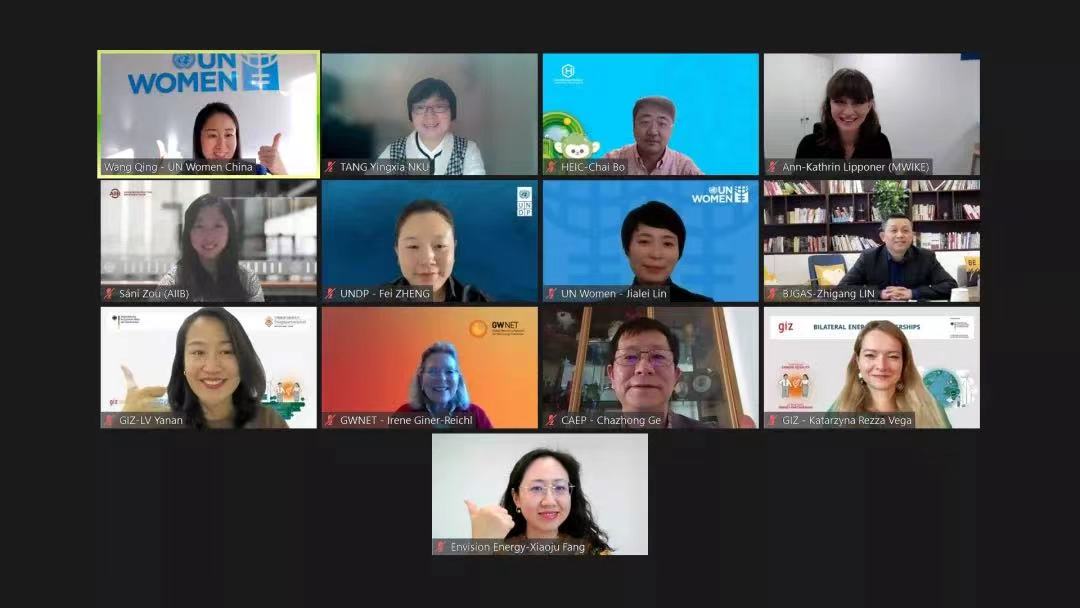Promoting Gender-just Green Transitions Online Workshop Held in Beijing
Date:

Beijing, China — On 15 November, the Gender-just Green Transitions workshop was held online by UN Women, UNDP and GIZ to tackle the gender gap in climate action. Women are more vulnerable than men to the negative impacts of climate change and climate disasters, especially women living in rural and poor areas. However, in most countries and regions, strategies to address climate change focus more attention on technological innovation for energy restructuring and less attention on the way climate change affects women and men. Gender differences, in terms of access to natural resources and participation in policymaking and economic activities, remain underappreciated as subjects of climate action.
Women’s participation, experience and voice are critical to develop innovative solutions and drive green, low-carbon transitions. Gender-just green policy measures can remove structural barriers to women’s participation in energy sector transformation, foster women’s career development and economic empowerment, and ensure that women are included in the green sector in the future.
The workshop convened representatives and stakeholders to discuss challenges and opportunities for women to meaningfully participate and lead in green transitions, and the potential for gender mainstreaming in relevant policies and practices. Representatives of governments, financial institutions, industrial associations, private sector stakeholders, civil society, think tanks, and bilateral and multilateral organizations exchanged their experiences from different perspectives.
In his opening speech, Thorsten Giehler, Country Director of GIZ China, emphasized women’s participation in generating innovative solutions and the importance of gender equality and diversity in energy transition.
Smriti Aryal, Country Representative of UN Women China, spoke of structural inequalities in addition to climate change and its impact. She said, “Effective measures are needed to tackle the gender gap in current climate action, including through collecting and using gender-disaggregated data, enhancing coordination and gender mainstreaming across sectors and all levels of government, strengthening the resilience of women, especially women who work in the informal sector and those who are most vulnerable to socioeconomic shocks, and unleashing women’s real and potential capabilities in green transitions.”
Beate Trankmann, Resident Representative of UNDP China, said UNDP is working to support countries around the world to connect the dots between climate action, social inclusion, gender equality and sustainable development. “A green economy transition is at the heart of reaching net-zero emissions. However, if not managed well, it risks widening social inequalities.”
Ge Chazhong, Professor and Chief Scientist of the Chinese Academy for Environmental Planning, Ministry of Ecology and Environment shared that "Chinese women are actively engaged in the cause of ecological and environmental protection, but the current environmental and climate policies still lack gender perspectives.” He suggested incorporating “gender perspectives into the ecological, environmental protection and climate change laws and policies, ensure the equal and legitimate rights and interests of women, including rural women, and strengthen women's decision-making and participation in ecological and environmental protection and climate response.”
Irene Giner-Reichl, founding member and Senior Advisor of the Global Women’s Network for Energy Transition (GWNET), emphasized “the energy transition requires not only behaviour change, innovation and integration across sectors, but also a large diverse talent pool.”
The workshop included panel discussions on integrating gender perspectives into policies, programmes and financing in green transition processes, and supporting women’s equal participation, promotion and leadership in green industries and enterprises. This event was a follow-up activity to the Women in Green Energy initiative, which was launched by GIZ in cooperation with various institutions in the framework of the Sino-German Energy Partnership and with support from the Federal Ministry for Economic Affairs and Climate Action of Germany (BMWK).
Originally published on UN China website.